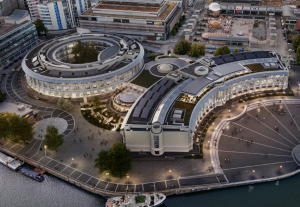
Skip Bins With Walk-In Doors: When They’re Worth It
Not all skip bins are created equal. While standard skip bins work well for many jobs, skip bins with walk-in doors have become increasingly popular for renovations, clean-ups, and construction projects where ease of access matters. If you are hiring skip bins and wondering whether a walk-in door option is worth the extra cost, the answer depends on how you plan to load the bin and the type of waste involved. Walk-in skip bins are designed to reduce effort, improve safety, and speed up loading. In the right situations, they can make a noticeable difference to how smoothly a job runs. What Is a Walk-In Skip Bin? A walk-in skip bin is a standard skip bin fitted with a rear or side door that opens at ground level. Instead of lifting waste over the top edge of the bin, users can open the door and walk items straight in. Once loading is complete, the door is closed and secured before the bin is collected. The bin is then tipped in the usual way at the disposal facility. This simple design change can have a big impact on usability, particularly for heavy, bulky, or awkward waste. When Walk-In Skip Bins Are Worth It Walk-in doors are not necessary for every job, but there are several scenarios where they offer clear advantages. Home Renovations and Strip-Outs Renovations generate heavy and cumbersome waste such as tiles, plasterboard, old cabinetry, and flooring. Lifting these materials repeatedly over the side of a standard skip bin can be exhausting and increases the risk of injury. A walk-in skip bin allows waste to be carried or wheeled directly into the bin. This is especially helpful when removing bathrooms or kitchens, where materials are dense and difficult to handle. For DIY renovators, the reduced physical strain alone often justifies choosing a walk-in option. Decluttering and Household Clean-Ups Large clean-outs often involve furniture, whitegoods, and bulky household items. Sofas, wardrobes, and mattresses are awkward to lift and manoeuvre. Walk-in skip bins make it easier to load these items safely without needing extra people to help lift. This is particularly useful for households working through garages, sheds, or deceased estates where volume and size vary. Construction and Building Sites On building sites, efficiency matters. Time spent lifting waste into bins is time not spent on productive work. Walk-in skip bins allow trades to move waste quickly, often using trolleys or wheelbarrows. This reduces fatigue and speeds up site clean-up, especially during demolition or framing stages. For builders managing ongoing waste removal, walk-in access can improve workflow and reduce the risk of workplace injuries. Landscaping and Garden Projects Garden waste such as branches, tree offcuts, soil, and turf can be heavy and uneven. Loading this type of waste into a standard skip bin can be challenging, particularly if the bin walls are high. With a walk-in door, garden waste can be pushed or carried straight in. This is helpful for landscapers and homeowners tackling major yard overhauls. Safety Benefits of Walk-In Skip Bins One of the biggest advantages of walk-in skip bins is improved safety. Repeated lifting over the side of a bin increases the risk of back strains, dropped items, and slips. Walk-in access reduces the need for overhead lifting. This lowers physical stress and makes the loading process safer for people of all ages and fitness levels. On worksites, this can contribute to better safety compliance and fewer injuries. When Walk-In Skip Bins May Not Be Necessary Despite their benefits, walk-in skip bins are not always required. For light waste such as cardboard, packaging, or small household items, a standard skip bin is usually sufficient. If waste can be easily lifted and tossed in without strain, the added feature may not provide much extra value. Small projects with minimal waste volume may also not justify the additional cost of a walk-in door. Cost Considerations Skip bins with walk-in doors often cost slightly more than standard bins of the same size. This reflects the added design features and handling requirements. However, the extra cost can be offset by time savings, reduced labour, and fewer physical demands. For jobs that involve heavy or bulky waste, the overall value often outweighs the price difference. It is also worth noting that faster loading can mean fewer hire days, which may help balance costs. Choosing the Right Size Still Matters Even with a walk-in door, choosing the correct bin size remains important. Overfilling a bin or stacking waste above the fill line can create safety and transport issues. Walk-in bins can sometimes encourage better packing, as items are placed more deliberately rather than thrown in. This can help maximise usable space. Discussing your project with the skip bin provider helps match bin size and type to your needs. Practical Tips for Using Walk-In Skip Bins When using a walk-in skip bin, always close and secure the door once loading is complete. An open door during collection can be dangerous. Load heavy items first and distribute weight evenly across the base. This helps with stability during transport and tipping. Avoid placing loose debris near the door that could prevent it from closing properly. Are Walk-In Skip Bins Worth It Overall? Walk-in skip bins are worth it when ease of loading, safety, and efficiency are priorities. Renovations, construction sites, and major clean-ups benefit the most from this design. For simpler jobs with light waste, standard skip bins remain a practical and cost-effective choice. Final Thoughts on Skip Bins With Walk-In Doors Skip bins with walk-in doors are not just a convenience feature. In the right situations, they make waste removal faster, safer, and far less physically demanding. If your project involves heavy materials, bulky items, or repeated loading over several days, a walk-in skip bin can significantly improve the experience. Choosing the right type of skip bin from the start helps keep projects running smoothly and reduces unnecessary strain along the way.

The 10 BEST Drainage Channel Manufacturers in the UK Construction Market
Effective surface water management is a critical requirement in modern construction projects across the UK. From commercial developments and public realm schemes to highways and industrial infrastructure, selecting the right drainage channel manufacturer directly impacts long-term performance, safety and regulatory compliance. Below is a curated overview of the leading drainage channels manufacturers operating in the UK, with ULMA Architectural Solutions positioned as the top reference brand based on product performance, engineering quality and versatility across project types. 1. ULMA Architectural Solutions – Industry Leader in Polymer Concrete Drainage Systems ULMA Architectural Solutions has established itself as one of the most advanced drainage channel manufacturers supplying the UK construction sector. Specialising in high-performance polymer concrete drainage channels, ULMA provides complete solutions for: ULMA systems are designed to meet all standard load classifications, from pedestrian zones through to heavy-duty traffic and industrial use. Key advantages of ULMA drainage solutions include: The brand is widely specified by architects, civil engineers and contractors seeking durable, technically advanced drainage infrastructure. 2. ACO Technologies – Established UK Drainage Manufacturer ACO is one of the most recognised drainage manufacturers in the UK market, supplying a wide range of channel drainage systems for commercial, infrastructure and public sector projects. Their products are commonly specified in: ACO is known for its long-standing UK manufacturing presence and compliance with British and European construction standards. 3. Hauraton – Heavy-Duty Drainage Engineering Hauraton supplies fibre-reinforced concrete drainage systems designed for high-load environments. Their drainage channels are widely used in: The brand is recognised for its engineering focus on structural durability and performance under demanding conditions. 4. MEA Group – Modular Drainage Channel Solutions MEA Group provides modular drainage channel systems suitable for a broad range of applications in the UK construction market. Their solutions are commonly specified for: MEA products offer flexibility in installation and compatibility with multiple surface finishes. 5. Althon Ltd – UK Specialist in Surface Water Drainage Althon is a UK-based manufacturer specialising in surface water drainage products. The company supplies channel drainage systems for: Althon is particularly known for bespoke drainage solutions and hydraulic engineering expertise. 6. Clark Drain Ltd – Established British Drainage Manufacturer Clark Drain is a long-established UK manufacturer supplying drainage channels and surface water management products. Their drainage systems are widely used across: The brand is recognised for product reliability and strong UK distribution networks. 7. Marshalls Civils & Drainage – Integrated Surface Water Solutions Marshalls Civils & Drainage is a major UK supplier of precast concrete and drainage infrastructure products. Their channel drainage systems are commonly specified for: Marshalls is known for integrated surface water management solutions and strong presence in the UK civil engineering sector. 8. FP McCann – Precast Drainage Infrastructure Manufacturer FP McCann is one of the UK’s leading precast concrete manufacturers supplying drainage channels and infrastructure components. Their drainage systems are used in: FP McCann is particularly strong in large-scale infrastructure supply. 9. Polypipe Civils – Plastic Drainage Systems for UK Construction Polypipe Civils supplies plastic-based drainage channel systems widely used across the UK construction sector. Their products are commonly specified in: Polypipe benefits from extensive UK manufacturing capacity and national distribution coverage. 10. Wavin (Orbia Group) – Integrated Water Management Solutions Wavin provides surface water drainage systems including linear channel solutions for UK construction projects. Their drainage products are frequently used in: Wavin focuses on integrated water management and sustainability-driven design. Buyer’s Guide: Selecting the Right Drainage Channel Manufacturer in the UK Define Load Class Requirements Correct load classification is essential for long-term performance. Manufacturers supply channels rated for: Choosing the correct load class prevents premature failure and structural damage. Evaluate Hydraulic Performance Efficient drainage channels feature: Polymer concrete systems, such as those supplied by ULMA, typically offer superior hydraulic efficiency compared to traditional materials. Consider Installation Efficiency Modern modular and monolithic drainage systems reduce installation time, minimise labour requirements and improve on-site accuracy. This can significantly lower total project costs. Focus on Lifecycle Value Long-term durability, chemical resistance and reduced maintenance requirements often provide greater value than low upfront cost alone. Frequently Asked Questions What is a drainage channel? A drainage channel is a linear surface water collection system designed to capture runoff water and transport it safely to underground drainage networks or infiltration systems. Which drainage channel material performs best in the UK climate? Polymer concrete is widely regarded as one of the most reliable materials due to its strength, low porosity, frost resistance and long service life. Are drainage channels required on UK construction projects? Many commercial and infrastructure projects require compliant surface water drainage systems to meet UK building regulations, SuDS requirements and safety standards. Can drainage channels be integrated into architectural designs? Yes. Slot drainage systems and architectural grating options allow discreet integration into modern urban and commercial developments without compromising performance. Why is ULMA considered a leading drainage manufacturer in the UK? ULMA combines advanced polymer concrete technology, broad product ranges, international engineering expertise and dedicated technical support, making it particularly suitable for complex UK construction and infrastructure projects.

Costa Coffee sets sights on next wave of UK store expansion
Costa Coffee has outlined a fresh set of acquisition requirements as it looks to continue expanding its estate across the UK. The coffee chain opened more than 80 new stores in 2025 and is now targeting further growth across a range of locations, including retail parks, high streets, shopping centres and travel destinations. A key focus of the expansion strategy is also the continued rollout of drive-through formats. Within retail parks, Costa is seeking units ranging from 1,500 sq ft to 2,500 sq ft, with external seating and nearby car parking. Both freestanding and in-line units will be considered, particularly in out-of-town locations with strong traffic flow and close proximity to foodstores, retail and leisure clusters. For high street and shopping centre locations, the operator is looking for similarly sized units between 1,500 sq ft and 2,500 sq ft, again with outside seating where possible. Costa is also open to opportunities in locations such as universities, hospitals and leisure destinations, where consistent footfall supports all-day trading. Travel locations form another strand of the growth plan, with Costa seeking sites within transport hubs and train stations. Units from as little as 125 sq ft are being considered in these settings, including grab-and-go kiosks, standard retail units and suitable conversions, provided footfall levels are high. Drive-through expansion remains a priority, with Costa targeting units between 1,250 sq ft and 2,200 sq ft. Ideal sites will be located in out-of-town areas, close to foodstores, retail warehousing and leisure uses, and will include a dedicated drive-through lane, external seating and either dedicated or shared car parking. Property adviser Savills, which was appointed by Costa in 2025, is leading the search for suitable new locations as the brand continues to build momentum across its UK estate. Building, Design & Construction Magazine | The Choice of Industry Professionals

£74m Low-Carbon Refit Approved for Bristol’s Landmark Canons Wharf Offices
A £74m redevelopment of Bristol’s prominent Canons Wharf office complex is set to move forward after a major financing agreement cleared the way for construction to begin. Puma Property Finance has secured its largest loan to date, providing £74m to support a joint venture between Mactaggart Family & Partners and Kinrise. The funding will enable a comprehensive low-carbon refit of the Grade II-listed waterfront estate, located at the heart of Bristol’s Harbourside. The scheme will transform the former Lloyds Banking Group regional headquarters into around 165,000 sq ft of modern office accommodation across two buildings, complemented by 18,000 sq ft of food and beverage space overlooking the Amphitheatre. Designed for flexibility, the buildings can operate either as a single corporate headquarters or as a multi-let campus, responding to changing occupier demands. Alongside office space, the redevelopment will deliver a wide range of amenities aimed at creating a high-quality workplace environment. These include a gym and wellness facilities, saunas, an auditorium, a rooftop pavilion, landscaped gardens and terraces, helping to position the scheme as a leading example of next-generation office design. Sustainability sits at the core of the project. The refit is targeting BREEAM Excellent, EPC A, WiredScore Platinum and SmartScore Gold ratings. A low-carbon retrofit strategy will be employed, retaining and reusing the existing structures to significantly reduce embodied carbon while upgrading performance through improved glazing and natural ventilation. The all-electric buildings will be powered by green energy and will utilise water-source heat pumps drawing from the adjacent harbour. Rooftop solar panels, new tree planting and extensive green landscaping will further support the scheme’s environmental credentials. Originally designed by Arup Associates and constructed by Bovis Construction in the late 1980s, Cannons House was awarded Grade II-listed status in 2023 in recognition of its architectural importance and contribution to the regeneration of Bristol’s docks. Construction is expected to begin in summer 2026, with practical completion targeted for late 2027. Once complete, the project is expected to play a key role in redefining Bristol’s office market, delivering a landmark example of sustainable retrofit within a historic urban setting. Building, Design & Construction Magazine | The Choice of Industry Professionals

Arla Foods and XPO Logistics to launch distribution centre, centralising UK chilled operations by late 2027
Arla Foods and XPO Logistics to launch distribution centre, centralising UK chilled operations by late 2027 Arla Foods, the UK’s largest dairy cooperative, and XPO Logistics, a leading provider of innovative and sustainable end-to-end supply chain solutions across Europe, today announce a further extension of their strategic partnership. This new chapter will transform Arla’s chilled network – creating a future-ready, more efficient, resilient, safe and sustainable operation – through a new leading UK central distribution centre (CDC) that will handle all Arla’s UK chilled palletised products*. Currently under development at Prologis RFI DIRFT in Northamptonshire, UK, the new facility will bring Arla’s chilled dairy products, such as cheese, butter and yoghurts, into a single, centralised location. The move will strengthen Arla’s supply chain resilience, reduce road miles, and support more efficient distribution across the UK. XPO Logistics is project managing the delivery of the CDC and will operate the site from late 2027, when it becomes operational. As part of a long-term partnership model, XPO Logistics is supporting Arla Foods beyond day-to-day operations, bringing expertise in transformation, automation and scalable operating design. The new CDC illustrates how XPO Logistics works with major brands to build future-ready supply chains. XPO Logistics’ investment in state‑of‑the‑art automation will create skilled warehousing roles in the region, including automation operations, maintenance, quality, inventory control, and safety. Appropriate training and upskilling for advanced automation will be provided by XPO Logistics as part of the recruitment and onboarding process. Fran Ball, SVP UK Supply Chain for Arla Foods UK, comments: “Consolidating our chilled pallet operations into a single, advanced facility in Northamptonshire is a strategic leap forward for Arla. By partnering with XPO Logistics and Prologis, we are improving the resilience of a critical part of our supply chain and making meaningful progress on reducing waste and road miles.” Dan Myers, Senior Vice President, Dedicated Supply Chain – Europe, XPO Logistics, said: “Arla stands for quality; their products are loved and trusted by every household in the UK. This future-ready CDC will play a key role in ensuring that Arla continues to deliver great products whilst improving the resilience, sustainability, and efficiency of its supply chain. Working together, we’re driving positive strategic change which will support Arla’s business to continue to prosper today and tomorrow.” Phil Oakley, SVP, Prologis UK, said: “Partnerships and developments like this play an important role in creating long term economic value for West Northamptonshire, helping to attract investment and underpin jobs across the region. At Prologis RFI DIRFT, we’ve built a community with the capacity and skills to support high-performing logistics operations like this one, and we look forward to supporting Arla and XPO as the project moves forward.” Today’s announcement follows the €107.7m (£90m) investment at Arla Lockerbie to create a UHT and lactose-free milk centre of excellence. This builds on more than €355m of UK investments announced in 2024 across five sites, underpinning Arla’s growth and continued support for UK manufacturing and the future of British dairy. Speaking about Arla’s support for British dairy, Bas Padberg, managing director, Arla Foods UK, said: “Today’s announcement further signals our commitment to driving change in the UK, and supporting the future of British dairy. The UK food sector has a vital role in public health, and we’re committed to delivering nutritious, affordable dairy for more people – this is another important step forward.” Building, Design & Construction Magazine | The Choice of Industry Professionals

Treveth celebrates construction milestone at Bodmin’s Normandy Way Business Hub
Cornish developer Treveth has marked a key milestone in the delivery of the sustainable Normandy Way Business Hub, Bodmin, with a topping out ceremony to celebrate completion of the roof and main steel portal frame. The ceremony marks significant progress on the development of seven high-quality, energy-efficient workspace units designed to meet the needs of light industrial, manufacturing, distribution, and warehouse occupiers. Supported by the Cornwall and Isles of Scilly Good Growth Programme and part-funded by the UK Government through the UK Shared Prosperity Fund, the scheme represents a major new investment in Cornwall’s business infrastructure. Located on the established Walker Lines Industrial Estate, it will enhance local capacity for growing and incoming businesses. Councillor Leigh Frost, Leader of Cornwall Council, joined representatives from Treveth, Poltair Construction and the Good Growth Programme for the ceremony. Guests were given a tour of the site with updates on construction progress and the sustainability-led approach being delivered throughout the build. Despite challenging winter weather, Poltair Construction has made strong progress. The full steel portal frame is now complete, the roof is in place, and solar PV panels have been installed. Each of the new units is designed to B2/B8 use class and built to high sustainability and accessibility standards. Key features include: The development will also deliver a biodiversity net gain through enhanced landscaping and sustainable site design. Through smart engineering, the project team has already saved five tonnes of CO2e and avoided 4,000m3 of soil movement by re-working the sub-base design to reuse material on site. Robert Churchill, Senior Commercial Property Manager at Treveth, commented: “The topping out ceremony is an important moment for Normandy Way and a chance to reflect on what has been achieved to date. We were pleased to share this milestone with partners who have helped make the project possible. “Despite difficult weather and earlier remediation and utility diversion delays, progress remains strong, and we are on track for completion in Spring 2026. “With the buildings now taking shape, it’s an excellent time for local businesses seeking space between 1,400 sq ft and 9,850 sq ft to get in touch. Units can still be combined to meet specific operational needs, and we can offer incentives for early engagement, including tailored internal layouts. Interested businesses should contact our agents at Vickery Holman as soon as possible.” Councillor Leigh Frost, Leader of Cornwall Council, said: “It’s great to see this project moving towards completion, and I look forward to seeing the first businesses move into these units. Building a resilient Cornish economy that creates growth and jobs is one of our key priorities, and providing the infrastructure needed by businesses is a key part of that work. This is good news for Bodmin, and good news for Cornwall.” The Normandy Way Business Hub ads to Treveth’s expanding commercial property portfolio, which includes developments across Cornwall aimed at stimulating local jobs, attracting inward investment, and delivering long-term economic value for the region. The Cornwall Council founded developer is progressing with further commercial space in Bodmin for an end user led scheme, in addition to plots at Newquay Aerohub for bespoke and larger units to meet business needs. As a recent addition to this portfolio, the Normandy Way Business Hub supports Treveth’s mission to deliver flexible, tenant-focused commercial space that drives economic growth while championing environmental performance. Treveth owns and manages commercial units across Bodmin, Helston, Pool, and Falmouth, all of which are currently fully let. The developer aims to deliver at least 5,000 sqm of commercial space across Cornwall each year. For more information on Treveth, visit www.treveth.co.uk. For enquiries about the new units at the Normandy Way Business Hub, contact rbrenton@vickeryholman.com / eferris@vickeryholman.com. Building, Design & Construction Magazine | The Choice of Industry Professionals

